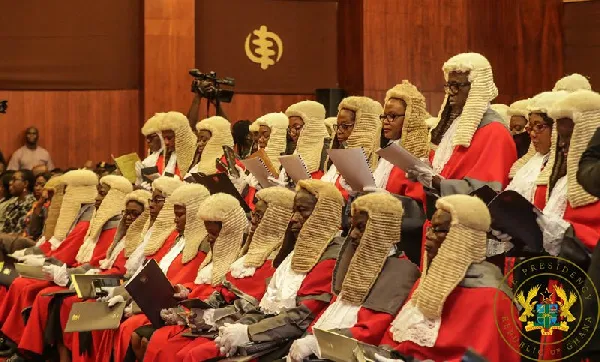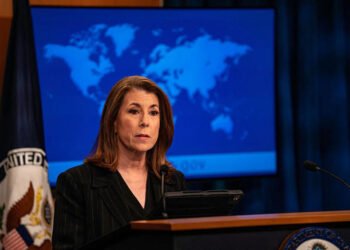In recent weeks, the independence of the judiciary has come under intense public scrutiny, as investigative journalist Manasseh Azure Awuni has joined a growing chorus demanding a critical reassessment of its current state.
Awuni made the stakes unmistakably clear in his assessment: judicial independence holds no real value “when the judiciary is chronically ill.”
He questioned whether Ghana’s judiciary still upholds the foundational spirit of constitutional protection envisioned at its inception.
Awuni emphasized that the architects of the 1992 Constitution deliberately sought to shield pivotal institutions—especially the judiciary—from political interference and partisan manipulation.
“In the wisdom of the framers, such officials should be able to exercise their duties without fear of being sacked the next day by a politician who is unhappy with them.
“The judiciary, one of such institutions, hasn’t given a good account of itself to back the framers of the 1992 Constitution. In my book, ‘The President Ghana Never Got,’ I have a chapter that names the judiciary as Akufo-Addo’s accomplice, and the reasons abound.”
Manasseh Azure Awuni
While Awuni acknowledged that there are competent and principled judges within Ghana’s judicial system who strive to uphold justice, he remained deeply critical of the judiciary’s leadership—especially at the apex level.
His concerns center on what he perceives as a persistent failure by the top ranks of the judiciary, particularly the Supreme Court, to demonstrate the level of integrity, impartiality, and courage expected of such an institution.
This, he argued, has weakened public trust and raised serious doubts about judicial independence in practice.

His criticism comes at a time when national attention is focused on a high-profile petition seeking the removal of the Chief Justice, a move that has ignited widespread political debate.
Yet Awuni cautioned against reducing the issue to partisan rivalry between the NDC and the NPP.
Instead, he called for a more principled national conversation—one that looks beyond party lines and centers on fairness, institutional credibility, and the fundamental need for accountability within the judiciary. “Let’s ask for fairness but resist the impression that security of tenure and immunity from accountability are synonymous.”
Awuni’s position is not merely a plea for political neutrality—it’s a firm call for governance rooted in principle. He contended that genuine judicial independence should not come at the expense of accountability; rather, the two must go hand in hand.
According to him, without mechanisms for oversight, independence risks serving as a cover for institutional complacency and abuse of power.
In his view, the judiciary, like any other arm of government, must be held to high standards, as it is not only politicians who contribute to the country’s challenges.
“If our judiciary had a mind of its own, if it could uphold the integrity and trust given to it and discharge its duties dispassionately, some of the political excesses would be curtailed.”
Manasseh Azure Awuni
Judiciary Urged Not To Shield Impunity Amid Quest for Independence
Manasseh Azure Awuni further emphasized that the judiciary’s unchecked power creates fertile ground for impunity.
He argued that if public officials and political elites were unsure of how the courts would rule—if they believed judgments would be fair, impartial, and free from political influence—they might act with greater restraint.

However, the judiciary’s current posture, in his view, gives these actors a sense of security, reinforcing the expectation of favorable and predictable outcomes for those in power.
Awuni framed this critique not as a denunciation of the judiciary itself, but as an essential call to uphold and preserve the integrity of democratic institutions.
“By all means, let’s call for fairness, but we must also recognise that exacting accountability from the judiciary is a necessary guardrail against the tyranny of what is supposed to be the most sacred institution in our country.”
Manasseh Azure Awuni

It is a sobering indictment—and one that is likely to resonate with Ghanaians increasingly disillusioned with governance structures that seem more self-serving than people-centered.
Awuni’s warning is particularly urgent given Ghana’s evolving political landscape, where constitutional checks and balances are more vital than ever.
For democracy to function as intended, no institution—not even the judiciary—can remain above reproach. Immunity from political interference must not be confused with immunity from accountability.
Accordingly, Awuni pointed out the contradiction between the lofty ideals the Constitution envisioned for Ghana’s Judiciary and the lived realities that citizens experience daily in their encounters with justice.
As the nation debates the future of its judiciary in the light of the Chief Justice’s removal petition, perhaps the most crucial takeaway isn’t simply whether the petition is politically motivated—but whether the judiciary has earned the public’s trust to withstand scrutiny and demand respect in equal measure.
Because when the final gavel falls, it is not just one judge or one petition that’s on trial—it is the credibility of the very institution that’s supposed to serve as the last line of defense against democratic decline.
READ ALSO: Ghana’s Secondary Bond Market Heats Up




















